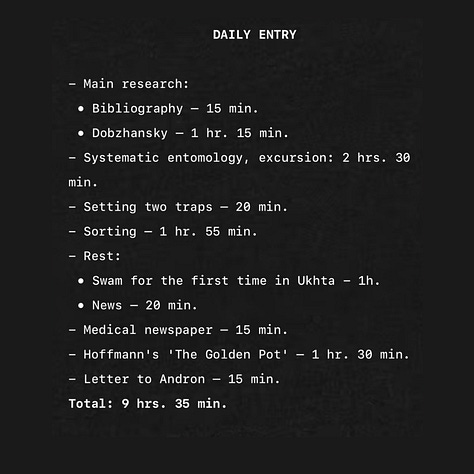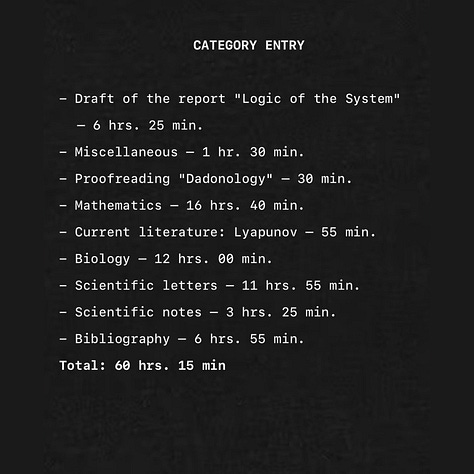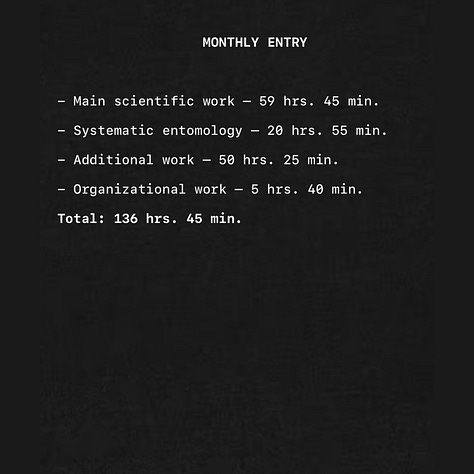A Simple Yet Powerful Productivity System 99% of People Don’t Know
Aleksandr Lyubishchev's time management made him one of the most efficient scientists in history. Here's his simple method — and the secret behind it...
Meet The Time Management Genius History Forgot
He tracked every minute of his life for 56 years and developed a productivity system like no other.
Born in the Russian Empire in 1890 in Saint Petersburg, Aleksandr Lyubishchev was destined for intellectual greatness from an early age. He graduated with honors from a technical school in 1906, then studied at the Imperial Saint Petersburg University where he excelled in natural sciences and became fluent in French, German, and English.
After completing his university education in 1911, Lyubishchev embarked on a distinguished academic career that would span decades. His contributions were both profound and diverse, making an undeniable impact in:
Entomology & Systematics - specializing in agricultural entomology and focusing on a complex subfamily of leaf beetles called earth fleas (Chrysomelidae: Alticinae)
Mathematical Methods in Biology - pioneering the application of mathematical approaches to biological problems
Philosophy of Science - challenging mainstream scientific opinions with independent thinking
But the fundamental aspect of his high performance lay in his exceptional persistence to manage time.
The Birth of a Revolutionary System
In 1916, at the age of 26, Lyubishchev developed his time management system. From that moment on, he effectively conquered time, enabling him to produce:
70 scientific papers published between the ages of 26 and 82
Over 12,500 pages of manuscripts and research on various topics
56 years of consistent time management practice
What makes this even more remarkable is that Lyubishchev maintained this productivity while:
Holding various academic positions at institutions across the Soviet Union
Teaching at prestigious institutions like Bestuzhev Courses, Tavrida National University, and Perm State University
Heading a laboratory in Bishkek for the Kyrgyz Academy of Sciences
Leading the Department of Zoology at Ulyanovsk State Pedagogical University
Lyubishchev's Powerful Yet Simple 5-Step System
The beauty of Lyubishchev's approach lies in its simplicity and effectiveness:
1. Planning
Create detailed plans categorized into three timeframes:
Monthly objectives
Annual goals
Five-year visions
This hierarchical approach ensures alignment between short-term actions and long-term goals, providing both direction and purpose to daily activities.
2. Time Recording
Maintain a meticulous record of time spent on various activities, including:
Work (documented in 15-minute intervals)
Reading and learning
Leisure and personal time
This time ledger became essential for understanding how time was allocated throughout each day. Lyubishchev maintained this precise recording practice consistently for decades.
3. Accounting
Summarize and analyze the recorded time by project and category. At the end of each month, Lyubishchev would compile and categorize his work time, analyzing his progress and identifying reasons for any uncompleted tasks.
This step helps identify patterns in time usage and assess productivity levels with remarkable objectivity.
4. Summary and Review
Conduct daily, monthly, and yearly summaries to evaluate progress against goals. Every five years, Lyubishchev would take a broader view, summarizing his accomplishments and planning future research directions.
This cyclical process ensures continuous improvement and adaptation of plans based on past performance.
5. Implementation of the System
The practical application of Lyubishchev's system involved several key elements:
Detailed Tracking: Lyubishchev meticulously recorded every productive minute, treating time as a tangible resource. He believed in the value of each hour, which instilled a sense of urgency and purpose in his daily actions.
Flexibility and Adaptation: While he adhered to his system rigorously, he also allowed for adjustments based on personal experiences and insights gained from his records.
Focus on Effective Time Use: The system emphasizes recording only productive hours, excluding trivial activities like casual conversations or breaks. That approach provides a more accurate picture of effective work time.



Work Approach Refinements
As his system matured, Lyubishchev developed additional nuances that enhanced his productivity:
Category Management: He divided his work into creative and routine tasks, prioritizing about 6 hours of creative work daily. This distinction allowed him to reserve his best mental energy for high-impact activities.
Avoiding Urgency: Lyubishchev was cautious about accepting urgent tasks, preferring to maintain composure and stick to his planned schedule. This deliberate approach helped him avoid the stress and inefficiency often associated with last-minute work.
Balance of Interests: He reserved time for personal pursuits, emphasizing the importance of maintaining diverse interests beyond his primary research areas.
The Secret Behind the Success
So simple, yet so effective. What was Lyubishchev's secret?
He admired life itself.
Time tracking creates a profound bond between you and life. You become present, aware, and more fulfilled. Suddenly, the "Tomorrow" (which never really exists for most of us) turns into Today.
Lyubishchev's system was not merely about productivity; it was about presence and conscious living. By tracking his time, he remained deeply aware of how he was spending his life, creating a sense of purpose and fulfillment that sustained his work for over five decades.
Work-Life Balance Before It Was Trendy
Perhaps most surprisingly, Lyubishchev achieved his remarkable productivity while maintaining what we would now call an excellent work-life balance:
He maintained 10 hours of sleep daily while remaining highly efficient
Only recorded highly focused work time in his system
Made time for personal interests and continuous learning
This approach challenges our modern notion that productivity requires sacrifice and burnout. Lyubishchev demonstrated that systematic planning, regular analysis, and a focus on balance can lead to exceptional productivity without sacrificing personal well-being or intellectual curiosity.
Legacy and Influence
After retiring in 1955 at the age of 65, Lyubishchev dedicated himself to theoretical biology and philosophy, aiming to create a natural system of organisms. He continued applying his time management principles until his death in 1972.
Aleksandr Lyubishchev's name isn't widely celebrated on social media or in productivity circles today. His secret knowledge remains unknown to many. But his approach has influenced modern time management techniques and continues to inspire individuals seeking to optimize their productivity and achieve meaningful goals.
If you're curious to dive deeper into his remarkable story, there's a rare book that holds his story: "This Strange Life" by Daniil Granin, published in 1974. This work brought Lyubishchev's ideas and work to a broader audience, preserving his legacy for future generations.
In our age of distraction and burnout, perhaps Lyubishchev's simple yet profound approach to time management is exactly what we need to rediscover.





